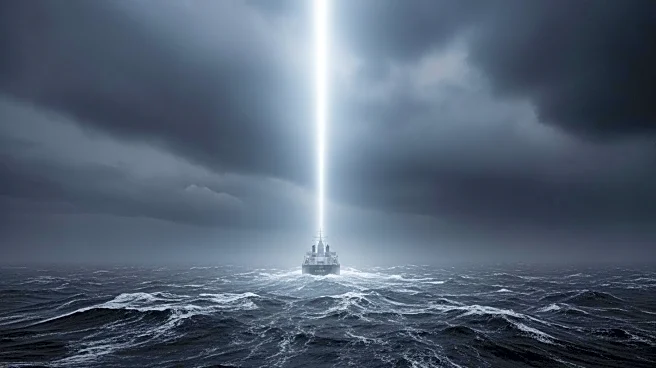What's Happening?
On October 2, Israel's military intercepted nearly all of the 40 boats in an aid flotilla bound for Gaza, detaining over 450 foreign activists, including Swedish campaigner Greta Thunberg. The flotilla, organized by the Global Sumud Flotilla, aimed to deliver humanitarian aid to Gaza, which has been under blockade. The interception has led to international condemnation and protests in cities across Europe, as well as in Karachi, Buenos Aires, and Mexico City. The Government of Bangladesh and Turkish President Tayyip Erdogan have strongly condemned the interception, calling it a violation of international law. The Israeli foreign ministry stated that all detained individuals are safe and in good health, and they are expected to be expelled from Israel in the coming days.
Why It's Important?
The interception of the aid flotilla highlights ongoing tensions surrounding the Gaza blockade, which has been a point of contention in international relations. The blockade has been criticized for exacerbating humanitarian conditions in Gaza, and the flotilla's mission was a high-profile attempt to challenge it. The incident has drawn attention to the broader geopolitical dynamics in the region, with countries like Turkey and Bangladesh condemning Israel's actions. The protests and international outcry underscore the global concern over the humanitarian situation in Gaza and the perceived use of blockades as a tool of war. This event could influence diplomatic relations and international policies regarding the Israeli-Palestinian conflict.
What's Next?
The detained activists are expected to be expelled from Israel and sent to European capitals on charter flights. The incident may lead to increased diplomatic tensions and calls for international intervention in the Israeli-Palestinian conflict. The flotilla's interception could also prompt further attempts to challenge the blockade, potentially involving larger humanitarian organizations. The international community may increase pressure on Israel to lift the blockade and address the humanitarian needs in Gaza. Additionally, the U.S. and Israel have proposed a new plan to end the conflict, which includes Hamas surrendering, and this development may impact the ongoing negotiations.
Beyond the Headlines
The interception of the flotilla raises questions about the legality and ethics of blockades in conflict zones. It also highlights the role of international activism in drawing attention to humanitarian crises. The involvement of high-profile figures like Greta Thunberg brings additional media attention and public scrutiny to the issue. The incident may influence public opinion and policy discussions on the use of humanitarian aid as a tool for political change. Furthermore, it underscores the challenges faced by activists in navigating international laws and the risks associated with humanitarian missions in conflict areas.









